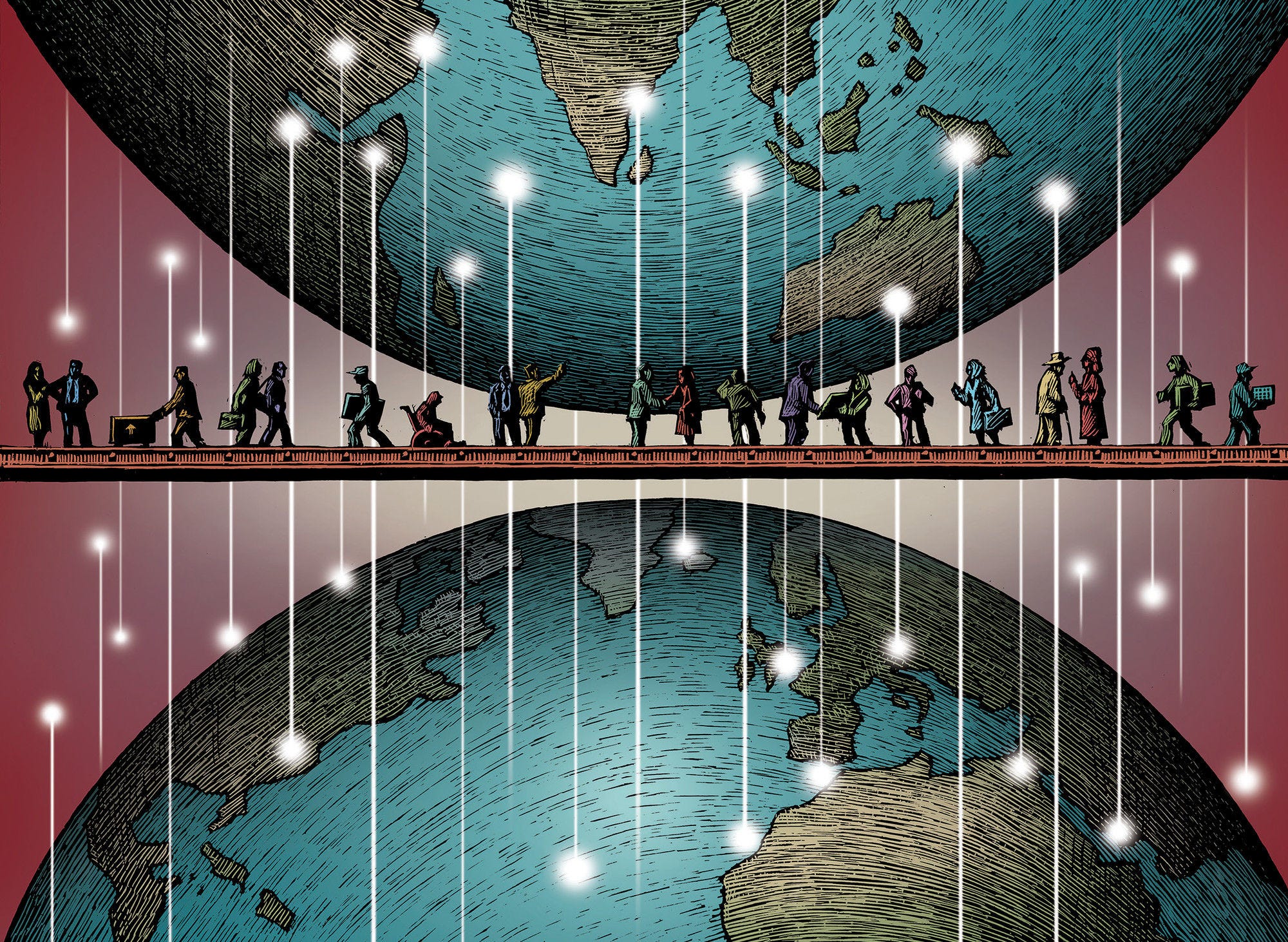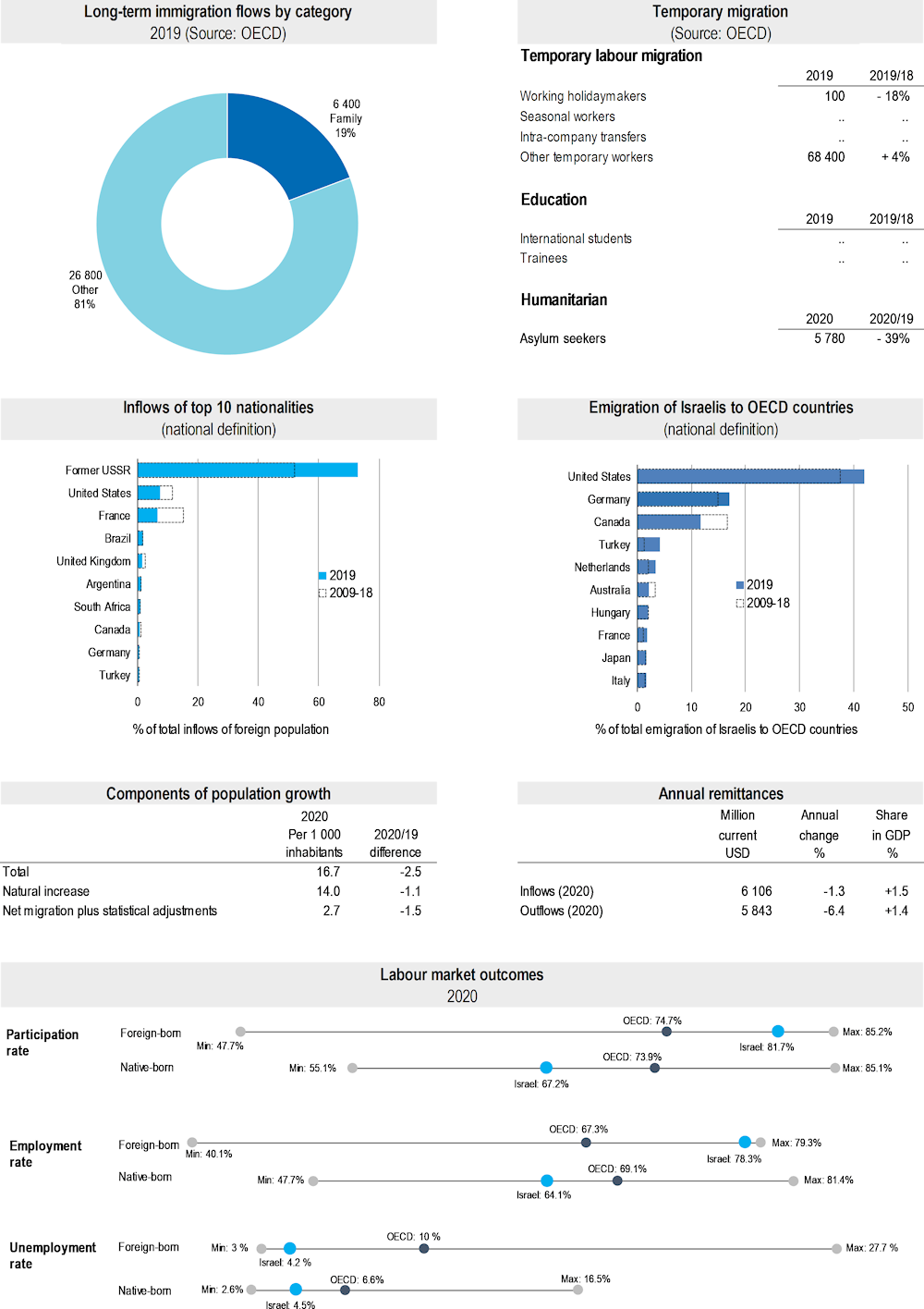In 2019, Israel received 33 000 new immigrants on a long-term or permanent basis (including changes of status), 18.3% more than in 2018. This figure comprises 19.2% family members (including accompanying family). Around 68 000 permits were issued to temporary and seasonal labour migrants.
Citizens of ex-USSR countries form the main group of newcomers in 2019 followed by US and French citizens. Among the top 15 origins, the ex-USSR countries registered the strongest increase (5 400) and France the largest decrease (‑200) in flows to Israel compared to the previous year.
In 2020, the number of first asylum applicants decreased by ‑38.8%, to reach around 5 800. The majority of applicants came from Russia (300), Ukraine (200) and India (200). The largest increase since 2019 concerned nationals of Serbia (38) and the largest decrease nationals of Russia (‑4 200). Of the 8 800 decisions taken in 2020, 0.7% were positive.
Emigration of Israelis to OECD countries increased by 2% in 2019, to 10 000. Approximately 45% of this group migrated to the United States, 13% to Canada and 11% to Germany.
No major changes in immigration policies were made during 2019‑21, a period which saw multiple elections and delayed formation of new governments. Israel maintained longstanding policies to encourage the immigration of Jews around the world to Israel, and to promote their integration in the labour market and society. 2019 was the year with the highest number of new permanent migrants in a decade.
Temporary foreign workers stood at 98 200 at the end of 2020, down from 102 000 a year earlier. The main sectors of employment were care (55 700), agriculture (22 300) and construction (14 900). Due to COVID‑19 restrictions, 80% fewer foreign workers arrived from abroad in 2020 than in 2019.
In 2020, the Israeli Government issued additional quotas: 2 500 auxiliary workers to be employed in Long Term Care Facilities (to be recruited through bilateral labour agreements), 700 Jordanian daily workers to work in the hotel industry in Eilat, and a temporary 2020 quota of 1 100 in the construction sector, above the 16 500 previously allocated. The seasonal agricultural quota was cancelled in 2019.
Palestinian cross-border workers numbered 82 800 at the end of 2019. A reform in December 2020 allowed Palestinian construction workers to receive their work permits directly, rather than granting it through a specific Israeli employer, and to change employers more easily. This reform aims to put an end to illegal trade in work permits and to allow competition between employers for the workers’ services.
Israel continues to sign bilateral labour agreements (BLAs) with: Thailand in agriculture (2020), Ukraine in construction (2020), Sri Lanka in home‑based caregiving (2019), and the Philippines in the hotel sector (2019). In September 2020, agreements were signed with both Georgia and Nepal for auxiliary workers for work in nursing homes and institutions.
Since 2017, no illegal border-crossers have been registered (they are considered “infiltrators” and remain on a tolerated status). The “Special Track for Voluntary Departure from Israel” supported the departure of 2 700 African border-crossers in 2019 and 840 in 2020, to their origin countries or, more often, resettled in countries that participate in resettlement programs sponsored by the United Nations High Commissioner for Refugees (UNHCR).
Since 2017, Darfurian asylum seekers meeting certain criteria whose applications have not been adjudicated have been obtaining temporary humanitarian protection status from courts or from the Ministry of Interior if certain criteria are met. In 2021, the High Court of Justice ruled that the State must adopt a policy concerning the status of Darfurian asylum-seekers by the end of December 2021.
Following COVID‑19 related border closures, Israel adopted measures for resident foreign workers, granting several temporary extensions of work visas beyond the maximum 63‑month stay, allowing continued employment. Suspension of deportation and permits for asylum seekers were also extended.
For more Information:

